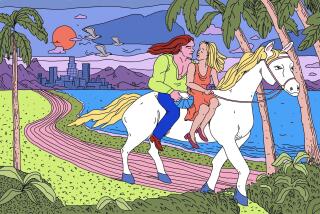Life as One Long Game of Lost and Found : SEVEN MOVES by Carol Anshaw; Houghton Mifflinges
- Share via
“Seven moves equal one fire,” the proverb goes, referring to the various ways life robs us of possessions and memories, slowly or quickly.
For Christine Snow, the protagonist of Carol Anshaw’s second novel, loss comes all at once. A lesbian, she has been living in Chicago with another woman, Taylor Heyes, for four years. Snow, a psychotherapist, and Heyes, a photographer whose assignments often take her overseas, own a house together and seem as married as two people without the sanction of the U.S. Congress can be.
Suddenly, Heyes disappears. Snow has no idea why. A minor quarrel the night before, concerning one of Heyes’ compulsive flirtations, seems an insufficient reason. They have survived such tiffs before. Could Heyes have been kidnapped or murdered?
Months go by, the police find no clues and, as Snow sinks into grief and depression, she begins to suspect something more mundane but just as shocking: She didn’t know her lover at all. And this means--a damning admission in her line of work--that she didn’t know herself.
Anshaw (“Aquamarine”) knows that the key to making this novel work is Snow’s ambiguous character. We must believe in the beginning that she has it all together; otherwise her disintegration would come as no surprise. Yet she also must have cause to be profoundly vulnerable.
The vulnerability is easier for Anshaw to manage. Snow’s father is a cardsharp. His daughter, too, knows how to deal from the bottom of the deck. She once helped him fleece rich country-clubbers and often fantasizes about leaving her job and making a killing in Las Vegas. Rejected by her mother because of her sexual orientation, Snow is used to living “on the margins.”
As a young woman, she was shy but needy. “The few times she has filled out sexual surveys, she had been surprised to find herself in the next-to-top category with regard to number of partners.” Her longest relationship before Heyes ended badly, making her “an atheist about love.” It has been a struggle for her to attain professional status and reinvent herself as a caring and responsible person.
But Snow, at 39, has succeeded. That Anshaw has no trouble making us concur with this is the more telling measure of her own success. “Seven Moves” is unusually well written; its greatest strength is the witty, hip, yet self-aware style in which Snow’s consciousness reveals itself:
“A couple of years back a hugely fat friend from college visited and wanted Chris Snow to take her to the women’s bars. Chris faked stomach flu rather than risk being spotted by someone who might assume they were an item. Chris fears there will be a cosmic payback for these lapses in character, that she will come back in the next life as plankton.”
This is a person not easily fooled, we would think. Yet only her belated discovery of a secret diary in Heyes’ computer confirms that Snow has been “sharing a life with someone who was going it determinedly alone.”
In outline, “Seven Moves” is similar to Tim Winton’s “The Riders.” It’s a mystery in which the search for the missing lover dissolves into an even more painful search for the origins of the protagonist’s blindness.
Snow revisits her past--her father, old lovers, the gay bar scene. She journeys to Morocco, home of a seductive Frenchwoman whose photo she found in Heyes’ darkroom. She neglects her patients and regresses into irrationality--consulting a psychic, reading omens.
Meanwhile, the good writing continues. Anshaw evokes the vastness of the Sahara and the slightest tremor of Snow’s emotions. She pokes some fun at the therapeutic process, but she also is accurate and respectful. Her minor characters, including straight people, dogs and children, are satisfyingly juicy. Her dialogue amuses and stings.
“Seven Moves,” above all, is a confident book. Anshaw doesn’t just show lesbians living normal, useful lives--which itself is enough to give the Christian right the willies. She isn’t afraid to show a downside as well--in this case, an obsessive romanticism with which heterosexuals can instantly identify.
More to Read
Sign up for our Book Club newsletter
Get the latest news, events and more from the Los Angeles Times Book Club, and help us get L.A. reading and talking.
You may occasionally receive promotional content from the Los Angeles Times.










